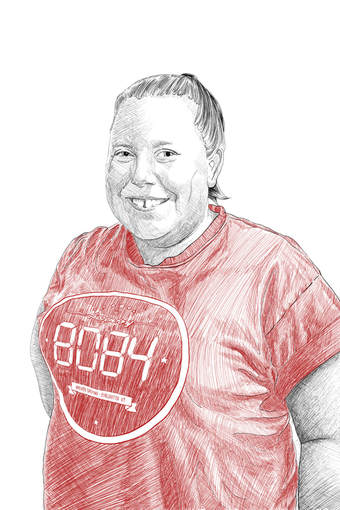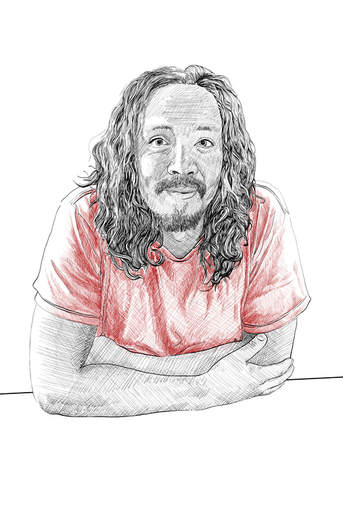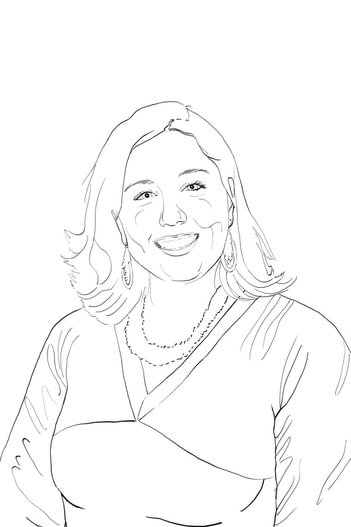|
Bridging one's political work with one's artistic practice in a meaningful way is not easy. There are three general ways artists have built this bridge:
As my own practice has progressed, I have been trying to move from using just method #1, that is, making art with some political or social justice content, to using methods #1 and #2. And this past Sunday, Jan 28, I had the chance to finally bring an oral history project I conducted in Barre, VT as part of my book/zine project, Metamorphic: The Transformation of Work in Granite Town, to some amazing working-class activists and organizers in Barre, VT at the VT AFL-CIO COPE Conference. The conference was held in the Old Socialist Labor Party Hall in Barre, a perfect space for both the conference and my project. I called my presentation "Voices and Contours of Labor: Notes and Drawings from My Oral History Project in Barre, VT". "COPE" stands for the "Committee on Political Education". At the VT AFL-CIO COPE Conference, that usually translates to talking about issues that concern labor that are currently moving through the legislature. So, bringing interdisciplinary art into such a space can seem like a tangential diversion that may be unwelcome -- but, fortunately, that was not at all the case. After all, political education can encompass so much more than electoral politics. While I completely understand the importance of educating ourselves on what is going on in our state's legislature and putting pressure on our representatives to get labor-friendly results, I was also taught a broader and deeper understanding of political education through my work with the Vermont Workers' Center, The Poor People's Campaign, and the Popular Education Project (PEP). In doing political education work with these organizations, I learned about the fundamental social forces of capital and labor under capitalism and how they move and interact. Understanding this allows us to see not only the possibilities right before us but also those of the future. So, despite how out of the box my art and research is in such a context, I went and ahead and did my presentation. I explained how I became interested in Barre because of its radical labor history and because it is a case study in deindustrialization -- before the term even came into popular parlance. Barre, like all cities that are commonly associated with the term deindustrialization, was once known as a center of industry but is now more known for its stagnant economy and poverty. It is a case study in the tendency of capital to reduce labor costs. There are many ways capital has achieved this, but the most powerful way by far has always been through technological development. Globalization, which is also often cited as a means of reducing labor costs, is dependent on developments in information and transportation technology, without which it would be impossible to coordinate free trade across the globe. At the same time, in the midst of deindustrialization and rapid technological development, is the possibility for freeing up more of our day from waged work. I continued to explain that I wanted to go beyond what other oral historians had done when interviewing people about work: I wanted to not only ask them how they felt about the work they did, but how they would feel about not working -- or, at least, not working as much. Automation will continue disrupt the economy; and, with technology becoming increasingly capable of replacing everything from unskilled to highly skilled labor (as adeptly pointed out by Martin Ford in his book The Robots Are Coming), work as we know it in the form of the the full-time job and the 40 hour work week may become more of a rarity in the job market. That means we may have to rethink our relationship to waged work if we don't want masses of people to be left out in the cold void of long-term to permanent unemployment. Then, after having talked to everyone about automation, the future, and robots, I brought it back to Barre with the oral histories I conducted there. Given my time limitations, I shared brief quotes from three different people working in Barre, VT, extracted from hours of recorded material. Overall, some people readily welcomed the prospect of a "postwork" society with more free time for workers. Some less so. Regardless, most expressed a desire to work less. Here is what I shared: Ellen, Early Childhood Educator “I need to be working and making a difference. And frankly, if I didn't have to work and I could spend as much time doing whatever I potentially was qualified to do, I would totally do something that I feel passionate about.” “I think automating all jobs is a terrible idea. I think that's not allowing us to be human anymore. I do feel like a lot of the work that I've done has been very purposeful. It's not just about going to work to make the paycheck. You're doing what was meant for you to do, the reason why you were put here, essentially.” “Even if I won the lottery, maybe at first I would take a break for a period of time from work, but I would not want to just retire for the rest of my life.” Gampo, Granite Carver/Finisher “If my needs were sort of more balanced, maybe I'd be more generous with the commission work. And that would be kind of cool actually. Because right now in capitalist society, you kind of go after lots of money, like is it big enough? You have a very targeted capitalistic mindset.” “I think when people's needs are met, it would be more sort of communal. I don't know if communal is the right word. It would be where people would just have a little more care for each other instead of competition.” Sarah Miller, Diversion Case Manager  “My parents have been retired now for, I guess, my mom's been retired for 18 years and my dad was retired for 18 years before he passed. They have really rich lives. My dad volunteered, my mom volunteers. She's a fiber artist. She crochets, she knits, she does embroidery and wins awards for it. She quilts and she goes to church and she has really deep relationships. I feel like more of her life is meaningful. She has more meaningful moments in that regard.” “It would be awesome if we had four day weeks. Every time I feel like three days is so much better to reset yourself. I just wish we didn't have to do it so much, that there weren't so many trappings, because I don't think the purpose of us being on this Earth is to work. I think we're just supposed to be here.” As you may have noticed, I haven't finished the digital drawings of all the interviewees yet: Sarah's is still in-progress. So what kind of response did I get for taking everyone on a sort of wild ride into possible futures merged with good old fashioned oral histories? How well was I able to bridge my political work with my artistic practice? Well, I can't say for sure what everyone was really thinking. But, people seemed pretty interested, and my presentation stimulated some good conversations over lunch. The conversations confirmed my belief that people are hungry for political education that is artistic, interdisciplinary, and experimental -- even when it comes to liminal subjects such as automation and robots that seem to sit somewhere between reality and science fiction. I grant that my artwork may not be categorized as material for political education in the strict sense of being designed explicitly to explain certain campaigns or concepts. However, I think political art that is brought into political spaces (that is, art that at least combines methods #1 and #2 for bridging political work and art), can be a powerful form of political education. It can encompass more than a single campaign or issue and get us all to think about that which we take for granted -- such as the fact that we must sell our labor power in order to survive. "The mental battlefield is littered with old and entrenched values and ideas", writes Willie Baptist in Pedagogy of the Poor, a brilliant political educator and poverty scholar whom I've had the pleasure of meeting (Baptist 163). In the context of my project, I am dealing with old values and ideas around work, in which waged work is the only kind of recognized work and reigns supreme over all the other labor we do for each other and ourselves; over taking care of our children, family, and friends; over volunteer work in our community; over the work we do to educate and cultivate ourselves. "'Plowing the field' of old ideas is indispensable to "planting seeds" of new ideas" (Baptist, 163). Waged work doesn't have to monopolize so much of our time. The question is what would we do and what would become if we had more free time? Major structural changes in our economy are on the horizon. Radical labor leaders in Barre, VT fought for the 8 hour work day, and, almost a hundred years later, we are long due for another reduction in the workday while still retaining our standard of living. That's why for me, as a working class artist, bridging politics and art is not only possible but necessary for a progressive and just future.
1 Comment
|
AuthorI am an interdisciplinary artist who brings together images, narratives, and social theory to reveal the lived and imagined systems that construct our lives. Archives
September 2019
Categories
All
|
 RSS Feed
RSS Feed
